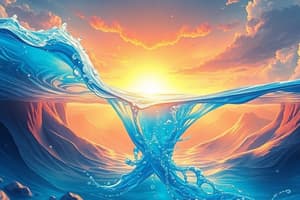Podcast
Questions and Answers
Water exists in four physical states: solid, liquid, gas, and plasma.
Water exists in four physical states: solid, liquid, gas, and plasma.
False (B)
The particles in the solid state of water are closely packed and arranged in a regular pattern.
The particles in the solid state of water are closely packed and arranged in a regular pattern.
True (A)
The particles in the liquid state of water are closely packed but not arranged regularly.
The particles in the liquid state of water are closely packed but not arranged regularly.
True (A)
The particles in the gas state of water are closely packed and arranged in a regular pattern.
The particles in the gas state of water are closely packed and arranged in a regular pattern.
Melting is the change in state from a liquid to a solid.
Melting is the change in state from a liquid to a solid.
The freezing point of water is 0°C.
The freezing point of water is 0°C.
Boiling is the change in state from a liquid to a gas.
Boiling is the change in state from a liquid to a gas.
Evaporation is the change in state from a liquid to a gas and only occurs at temperatures below the boiling point.
Evaporation is the change in state from a liquid to a gas and only occurs at temperatures below the boiling point.
Condensation is the change in state from a gas to a liquid and only occurs at temperatures at or below the boiling point.
Condensation is the change in state from a gas to a liquid and only occurs at temperatures at or below the boiling point.
Transportation is the process in the water cycle when water droplets join together to form clouds.
Transportation is the process in the water cycle when water droplets join together to form clouds.
Which state of water has particles that are closely packed and arranged in a regular pattern?
Which state of water has particles that are closely packed and arranged in a regular pattern?
At what temperature does water freeze and change from a liquid to a solid?
At what temperature does water freeze and change from a liquid to a solid?
What is the process called when water changes from a gas to a liquid?
What is the process called when water changes from a gas to a liquid?
What is the process called when water changes from a liquid to a gas?
What is the process called when water changes from a liquid to a gas?
What is the temperature at which water boils and changes from a liquid to a gas?
What is the temperature at which water boils and changes from a liquid to a gas?
Which process in the water cycle occurs when water droplets join together to form clouds?
Which process in the water cycle occurs when water droplets join together to form clouds?
Which process in the water cycle occurs when sunlight warms the surface of the water and causes water particles to escape and become water vapor?
Which process in the water cycle occurs when sunlight warms the surface of the water and causes water particles to escape and become water vapor?
What can we do to help reduce water pollution?
What can we do to help reduce water pollution?
Which state of water has particles that are far apart?
Which state of water has particles that are far apart?
Which process in the water cycle occurs when water droplets fall as rain?
Which process in the water cycle occurs when water droplets fall as rain?
Flashcards are hidden until you start studying
Study Notes
States of Water
- Water exists in three physical states: solid, liquid, and gas.
- In the solid state (ice), particles are closely packed and arranged in a regular pattern.
- In the liquid state, particles are closely packed but not arranged regularly.
- In the gas state (water vapour), particles are far apart.
Changes in State of Water
- Melting: change from solid to liquid, occurs at 0°C.
- Freezing: change from liquid to solid, occurs at 0°C.
- Boiling: change from liquid to gas, occurs at 100°C.
- Evaporation: change from liquid to gas, occurs at temperatures below 100°C.
- Condensation: change from gas to liquid, occurs at temperatures at or below 100°C.
The Water Cycle
- Evaporation: water particles absorb energy, escape from the surface, and become water vapour.
- Condensation: water vapour cools, condenses, and forms small water droplets.
- Cloud formation: water droplets join together to form clouds.
- Transportation: clouds are carried to other places by wind.
- Precipitation: water droplets fall as rain when they become heavy enough.
Reducing Water Pollution
- Everyone has a responsibility to reduce water pollution.
- Ways to reduce pollution: use less detergent, do not throw rubbish into the sea or rivers, and do not pour waste water into rainwater drains.
Studying That Suits You
Use AI to generate personalized quizzes and flashcards to suit your learning preferences.



